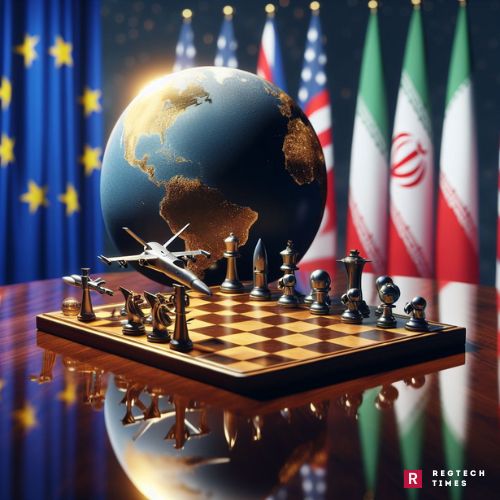At a conference in Brussels, the leaders of the European Union have decided to target Iranian drone and missile makers with penalties, marking a significant diplomatic uptick. This move comes after Iran launched an extraordinary drone and missile strike on Israel over the weekend, which was Tehran’s first direct assault on Israeli territory.
Drones and missiles were launched in full force, but Israeli defences effectively intercepted the onslaught, causing little damage. The deadly attack on the Iranian consulate in Damascus, which was mostly blamed on Israeli forces, was apparently the reason for the reprisal. Due to this series of events, the already unstable Middle East is now considerably more unclear, leading to strong worldwide appeals for moderation.
The EU’s position was outlined by Council President Charles Michel, who emphasized that the sanctions are a “clear signal” that the European Union is against Iran’s aggressive acts. “We have made the decision to impose sanctions on Iran,” Michel said. “The idea is to target the companies that are needed for the drones, for the missiles.”
Rather of imposing more extensive economic sanctions that may have an impact on the Iranian populace as a whole, this strategy advocates strategically targeting the industrial and technological foundation that underpins Iran’s military capabilities.
The European Union’s choice to concentrate on manufacturers of drones and missiles is noteworthy considering the targets’ specificity. This is a response to Iran’s recent aggressiveness as well as a means of limiting its capacity to launch similar strikes in the future. Iran was previously subject to sanctions by the European Union due to its involvement in providing Russia with drones used in the continuing conflict in Ukraine. These penalties, however, demonstrated the limitations and complexity of international sanctions since they had no effect on Tehran’s policies or its partnership with Moscow.
In reaction to the incident, Israeli Prime Minister Benjamin Netanyahu said that his administration would decide on the best course of action, raising the possibility of military or geopolitical measures. Netanyahu’s remarks coincided with larger calls from throughout the world for a de-escalation, with several major nations advising all sides of the conflict to use the greatest amount of caution.
In an official statement, the European Union emphasized the need for moderation, urging all regional parties to “refrain from any action that may increase tensions.” This is in line with the EU’s overarching foreign policy strategy, which places more emphasis on diplomacy and stability than on using force, especially in a volatile region like the Middle East.
In a related issue, the impending Security Council decision on the Palestinians’ application to become a full member state of the UN further complicates the current geopolitical dynamics. The timing of this decision, which coincides with rising tensions between Iran and Israel, complicates matters diplomatically on a global scale and may have an impact on the positions of other nations both inside and beyond the region.
The latest conflicts have had catastrophic repercussions for civilian populations in terms of humanitarian relief. Thousands of Palestinians are said to have died or been injured as a result of Israel’s retaliation strikes on assaults that Hamas launched. These numbers demonstrate the terrible reality of how the fighting affects civilians, highlighting the pressing need for international collaboration and efficient conflict resolution procedures in order to save civilian life.
You might also like: Additional US Sanctions on Iran: Here is what you should know
The most recent round of sanctions imposed by the European Union on Iran highlights the difficult balancing act that the international community must do in order to address security issues without allowing the conflict to worsen. It is unclear if these sanctions will have any influence on Iran’s military aggressions or change its strategic thinking. But they undoubtedly represent a turning point in the European Union’s attempts to address and maybe resolve one of the most intricate geopolitical challenges of our day.
The globe is keeping a careful eye on this developing scenario, hoping that diplomacy will win out over more armed conflict. The result of the UN decision and the accompanying responses from across the world will surely have a big impact on how this complex issue develops in the next days and weeks.


